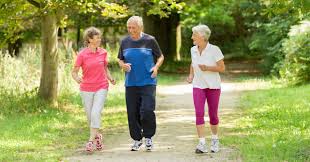
Each year we celebrate Men’s Health Week during the week leading up to Father’s Day. During this week the medical community takes time to point out important health facts and statistics that are unique only to men. For instance, did you know men live on average 5 years less than woman? Or that 1 in 2 men will develop cancer versus 1 in 3 women developing cancer in a lifetime? This and other reasons are why we must recognize and support the men in our lives to take steps to improve their health and well-being so they can continue to be active, engaged members of our families, our churches and our communities.
Stress, cardiovascular disease, diabetes, prostate, lung and testicular cancer are all examples of why it is important for men to go for regular physicals and cancer screenings. While going to the doctor’s isn’t enjoyable for anyone, did you know that if caught early enough cancer has a greater chance of going into remission? Or that by modifying a person’s eating habits or taking just a 15 minute walk a day they can possibly decrease their blood pressure and blood sugar by as many as 10 points! In some instances that can mean not having to take additional medications. Small changes like this can add up to a more successful, healthier lifestyle.
Below are a few tips for men (or for women to pass along to the men in their lives) during Men’s Health Week:
- Schedule a physical with your provider. Many of the factors that cause men to live shorter lives are preventable. Schedule your visit with your provider during this week and then talk with them about how you are feeling at your appointment. Ask about what cancer screenings you should be having at this point in your life.

- Let’s get physical! There are so many benefits to physical activity but many people aren’t sure where to start. How about with a 15 minute walk 3-5 times a week? Or if it’s too warm outside, how about an extra lap around the grocery store or at the local indoor shopping mall. Just 15 minutes a day can have huge benefits for your health.

- Reduce your stress. Men often do not open up about the stresses they have in life thinking they need to take care of everyone else however this is not healthy. This business of ‘keeping things bottled up’ can have dangerous effects on one’s health. Here are some ideas to help you take steps towards reducing your stress: talk to your friends for support; be sure to get enough sleep (the recommendation is 7-8 hours a night); make good food choices and possibly most importantly, do not forget the spiritual aspect of life, praying or taking a few minutes a day to just sit and be still. All of these small changes can help lead to less stress daily.

- Make good food choices! We all hear about healthy eating everywhere we go, but the question is, does it really help? It does. By eliminating canned fruits and veggies or rinsing them before eating them we can reduce the amount of salt and sugar in them by up to 50%. That is a lot of sugar and salt that our bodies do not necessarily need. When possible eating fresh fruits and vegetables is recommended as they contain vitamins and minerals that can help protect our bodies from some chronic disease. Try to limit drinks such as soda or iced tea that tend to have a lot of sugar in them, instead choose water. Water helps you to stay hydrated and flush out the excess sugar and salt in our bodies.

- Know the signs and symptoms of a heart attack. Some people believe chest pain is the only sign of a heart attack but that is not true. Pain in the jaw, neck or back; feeling weak or faint, difficulty breathing or catching your breath and pain in your arms or shoulder can all be signs of a heart attack as well. Be sure you know these signs and share them with a friend. Take note of where the Automated External Defibrillator (AED) is located in your churches, community centers, shopping areas next time you visit them. When someone is having a heart attack every second counts so using an AED that is in the community could help save a life. The more you know what to look for the quicker you will be to respond and possibly save your life or the life of someone you know and love.

- Know the signs and symptoms of a heart attack. Some people believe chest pain is the only sign of a heart attack but that is not true. Pain in the jaw, neck or back; feeling weak or faint, difficulty breathing or catching your breath and pain in your arms or shoulder can all be signs of a heart attack as well. Be sure you know these signs and share them with a friend. Take note of where the Automated External Defibrillator (AED) is located in your churches, community centers, shopping areas next time you visit them. When someone is having a heart attack every second counts so using an AED that is in the community could help save a life. The more you know what to look for the quicker you will be to respond and possibly save your life or the life of someone you know and love.

